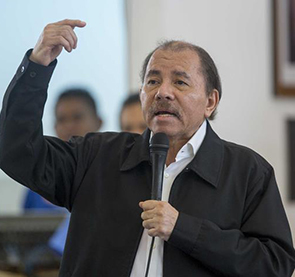MANAGUA, (Reuters) – Talks between the Nicaraguan government and local civil groups to end two months of political unrest hit a snag yesterday after the government dismissed calls for an international probe into violence during the protests that has left 170 people dead.
Facing a popular backlash after weeks of bloodshed on Nicaraguan streets, President Daniel Ortega agreed to resume talks mediated by the Catholic Church that also aim to bring democratic reforms.
The talks were marred by reports of fresh violence in Managua, the capital, and disagreements between negotiators. Local television showed images of police firing assault rifles near a university campus. University students have led demonstrations against what they say is Ortega’s growing authoritarian rule.
The government rejected a proposal by the church to allow two international commissions and a team from the European Union to investigate the killings and other crimes committed during the demonstrations.
“If we are not able to reach an agreement on something so elemental, they are putting in jeopardy the stability of the country,” said Silvio Baez, one of the bishops mediating the talks. “We all want to know the truth of what happened. Nicaraguans demand to know.”
Negotiators agreed to vote on the proposal again after a lunch break. Talks had not yet resumed after more than five hours, but church organizers told Reuters that negotiations had not collapsed.
The protests have also brought the economy of the poor Central American nation to a halt.
Thousands of shopkeepers and businessmen across the country participated in a national strike on Thursday. Streets were deserted and supermarkets, gas stations and corner stores shut down for 24 hours.
Since Ortega’s second stint as president began in 2007, the former socialist guerrilla and Cold War-era U.S. foe has increased his control over Nicaragua’s courts, electoral body and Congress. His opponents accuse him of attempting to turn the country into a dictatorship.
Civic leaders have demanded that Ortega shorten his third consecutive term that ends in 2021 to ease political tensions.
Previous talks were suspended last month after witnesses and rights groups accused government security forces of opening fire on thousands of demonstrators during a truce.
Ortega’s government has said protesters are vandals financed by right-wing groups attempting to destabilize it. His administration has called for protesters to dismantle hundreds of makeshift roadblocks that have strangled domestic trade and curbed commerce.
The Nicaraguan Center for Human Rights, which has monitored the violence, said 170 people have been killed in the eight weeks of clashes between pro-Ortega forces and protesters armed with rocks, slings and homemade mortars, with hundreds more injured.
The center said that number is up from 164 after taking into account deaths on Wednesday and Thursday, adding that the vast majority of the dead have been anti-government protesters.
Ortega’s surprise decision in April to slash pension benefits to cover a widening social security gap triggered the deadly confrontations, the bloodiest since a civil war ended in 1990 in the Central American nation.
Ortega, the leader of the Sandinista rebel movement in the 1980s, quickly abandoned the planned spending cuts. But the subsequent violent crackdown on protesters fueled nationwide demonstrations against him.

